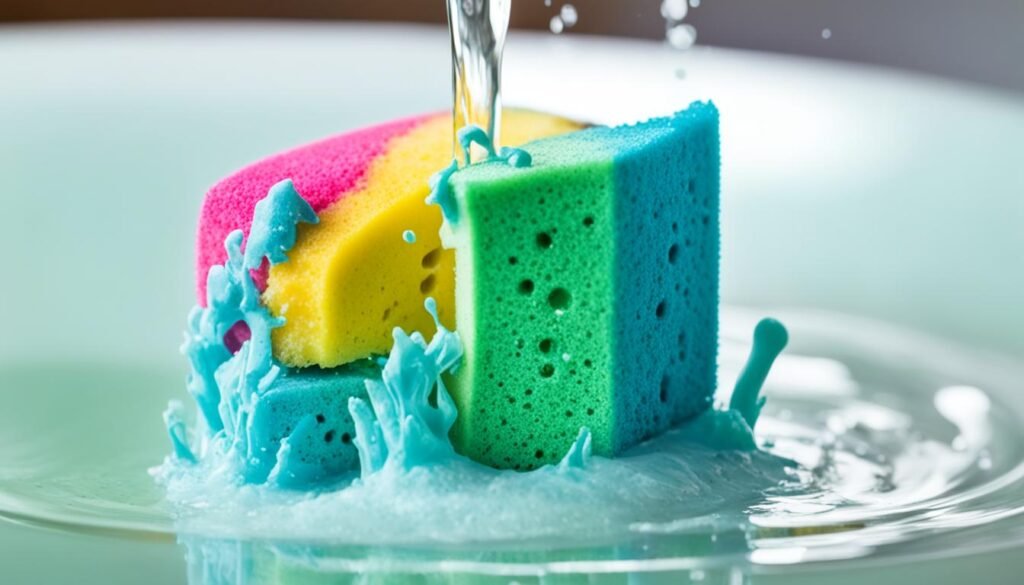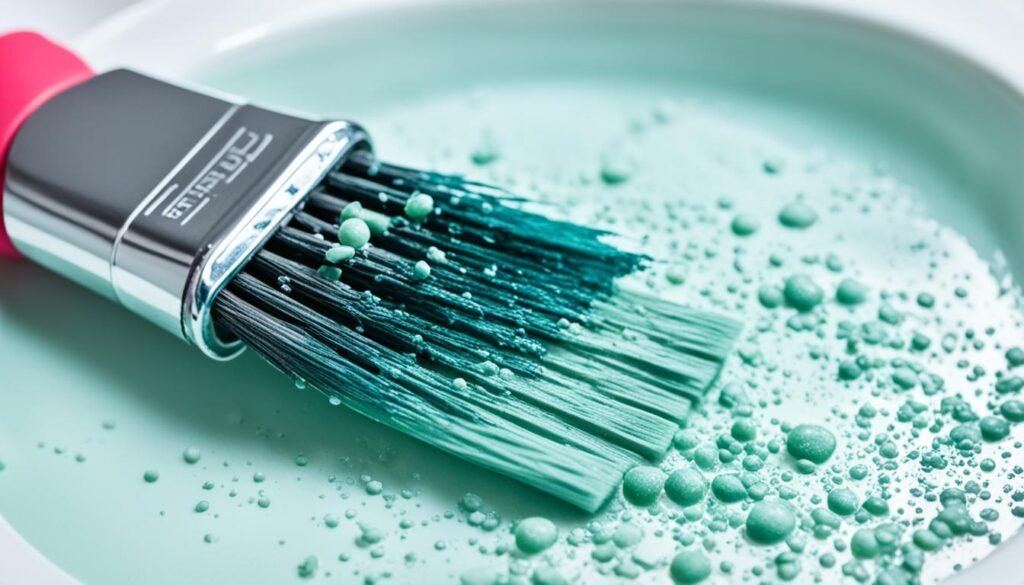When was the last time you cleaned your makeup brushes? If you’re like many people, the answer might be “never” or “not sure.” But did you know that failing to clean your brushes regularly can lead to bacterial growth, skin irritations, and even acne breakouts? Cleaning your makeup brushes is not just about hygiene—it’s also crucial for maintaining optimal brush performance and ensuring a flawless makeup application.
So, are you ready to learn the best way to clean your makeup brushes? In this article, we will guide you through the step-by-step process, share gentle brush cleaning tips, recommend effective brush cleansing techniques, and provide you with the ultimate brush cleaning routine. Say goodbye to dirty brushes and hello to a fresh and flawless makeup experience!
Why Should You Clean Your Makeup Brushes?
Cleaning your makeup brushes is crucial for maintaining hygiene and ensuring optimal performance. Neglecting to clean your brushes can lead to a host of issues, including the transfer of bacteria and germs onto your skin, spotty application, and difficulty in blending. By regularly cleaning and maintaining your brushes, you can enjoy the following benefits:
- Improved Hygiene: Makeup brushes accumulate bacteria, dirt, oils, and old makeup over time. Cleaning them removes these impurities, reducing the risk of skin infections and allergic reactions.
- Enhanced Performance: Clean brushes ensure proper product application and true color payoff. They allow for seamless blending to achieve professional-looking makeup looks.
- Prolonged Lifespan: Regularly cleaning your brushes helps preserve their quality and longevity. By maintaining the cleanliness of the bristles, you can ensure that your brushes continue to perform at their best.
Investing a little time in cleaning your makeup brushes can go a long way in maintaining their hygiene and maximizing their performance.
How Often Should You Wash Your Makeup Brushes?
Regularly cleaning your makeup brushes is crucial for maintaining their cleanliness and performance. But how often should you wash them?
According to experts at Mineral Tones and Mineral Sparkle, it is recommended to wash your makeup brushes at least once a week. This weekly routine is essential for removing accumulated makeup, dirt, and oils that can lead to bacterial growth and acne breakouts.
If you frequently change your makeup colors or use different products, you may need to clean your brushes more often. This is to prevent mixing pigments and to ensure that each brush is clean before applying a new product.
By establishing a weekly brushing routine, you can maintain the optimal functionality of your brushes and prolong their lifespan. Not only will clean brushes provide better makeup application, but they will also help keep your skin healthy by minimizing the risk of infections and irritations.
So, make it a habit to set aside some time each week to give your makeup brushes a thorough cleaning. Your brushes and your skin will thank you!

To summarize:
- Clean your makeup brushes at least once a week.
- Consider cleaning them more frequently if you regularly change colors or products.
- Avoid bacterial growth, acne breakouts, and potential skin irritations by maintaining a weekly brushing routine.
- Prolong the lifespan of your brushes and ensure optimal functionality.
What Products Should You Use to Clean Your Brushes?
When it comes to cleaning your makeup brushes, using the right products is crucial for effective brush cleansing. There are several recommended brush cleaning products that can help you maintain the cleanliness and performance of your brushes.
One popular option is Oribe’s Signature Shampoo, which is known for its gentle formula that is suitable for natural hairs. It effectively removes makeup residue and oils without damaging the bristles.
The Parian Spirit Professional Makeup Brush Cleaner is another highly regarded product in the beauty community. This brush cleaner is formulated to dissolve various types of makeup, leaving your brushes clean and ready for use.
Cinema Secrets Makeup Brush Cleanser is a great choice for denser and dirtier brushes. This professional-grade cleanser deep cleans the bristles, removing stubborn makeup and leaving the brushes in optimal condition.
If you prefer using gentle soaps to clean your brushes, options like Mrs. Meyer’s Clean Day Dish Soap or a sulfate-free shampoo can be effective. These mild cleansers help to break down makeup and oil buildup without causing damage to the bristles.
Another gentle and commonly recommended option is to use baby shampoo. Baby shampoo cleanses the brushes while keeping the bristles soft and conditioned.
When choosing products for cleaning your makeup brushes, it’s important to avoid harsh solvents or cleansers with high alcohol content. These can strip the natural oils from the bristles and ultimately reduce the longevity of your brushes.
Remember, using the right brush cleaning products is essential for maintaining the hygiene and performance of your makeup brushes. Experiment with different options to find the one that works best for you and your brushes.
“Using the right brush cleaning products is essential for maintaining the hygiene and performance of your makeup brushes.”
How to Clean Your Makeup Brushes Step-by-Step
To ensure that your makeup brushes are clean and ready for optimal application, follow this step-by-step process:
- Rinse the brush tips under lukewarm running water to remove residual makeup.
- Shampoo the brushes using a clarifying or gentle shampoo mixed with lukewarm water. Avoid getting the whole brush head wet.
- Swirl and massage the brush tips in the shampoo mixture to create lather.
- Rinse the brush tips under running water to remove shampoo residue.
- Repeat the shampooing and rinsing process until the water running from the brush is clear.
- Squeeze out excess water from the brush bristles using clean, dry paper towels.
- Lay the brushes flat on a dry towel, with the tips hanging off the edge, to allow them to dry naturally.
- Leave the brushes to dry for at least a day or overnight before using them again.
- If the bristles feel stiff after cleaning, apply conditioner to soften them.
By following this step-by-step makeup brush cleaning process, you can effectively remove makeup residue, dirt, and bacteria, ensuring clean and hygienic brushes for your next application.
Alternative Household Products for Brush Cleaning
In addition to commercial brush cleaning products, there are several common household items that can be used to effectively clean your makeup brushes. These DIY solutions offer convenient and cost-effective alternatives. Here are some household items that you can use:
- Liquid Dish Soap: Liquid dish soap is a versatile and effective option for removing caked-on makeup residue from your brushes. Simply mix a small amount of dish soap with warm water and gently swirl the bristles in the solution. Rinse thoroughly and let them air dry.
- Vinegar and Lemon: Vinegar and lemon are natural disinfectants that can help sanitize your brushes. Create a mixture of hot water and white vinegar, and dip your brushes into it. After rinsing off the vinegar mixture, rub the bristles against a cut lemon to remove any lingering scent. This leaves your brushes smelling fresh and clean.
- Baby Shampoo: Baby shampoo is a gentle option for brush cleaning. Its mild formula effectively cleanses the bristles without causing damage. Mix a small amount of baby shampoo with warm water, swirl the bristles, rinse thoroughly, and allow them to dry.
These household items offer simple and effective solutions for keeping your makeup brushes clean and ready for flawless application. Experiment with these DIY options to find what works best for you.
For a visual guide on how to clean makeup brushes using alternative household products, check out the image below:
| Step | Description |
|---|---|
| 1 | Rinse the brushes under lukewarm water. |
| 2 | Apply a small amount of liquid dish soap, vinegar mixture, or baby shampoo to the bristles. |
| 3 | Gently swirl the bristles in the cleaning solution. |
| 4 | Rinse the brushes thoroughly to remove any residue. |
| 5 | Squeeze out excess water and reshape the bristles. |
| 6 | Lay the brushes flat to dry. |
Cleaning Sponges
Makeup sponges are a staple in many beauty routines, providing a flawless and airbrushed finish. However, it’s important to keep them clean to maintain hygiene and prevent bacterial build-up. Regularly cleaning your makeup sponges is essential for ensuring even application and extending their lifespan.
Depending on the amount of product you use and how often you apply makeup, a twice-weekly or daily washing may be necessary. This will help remove dirt, oil, and leftover makeup from the sponge.
When it comes to cleaning sponges soaked in silicones and oils, using a degreasing agent like Dawn dish soap can be highly effective. Simply dampen the sponge, apply a small amount of dish soap, and gently work it into a lather. Rinse the sponge thoroughly to remove any soap residue.
It’s important to note that using cleansers with high alcohol content or harsh solvents can damage the sponge and affect its performance. Stick to gentle cleaning methods to ensure the longevity of your makeup sponges.

By regularly cleaning your makeup sponges, you can ensure that they remain in optimal condition, provide seamless application, and prevent the accumulation of bacteria. Clean sponges contribute to a healthier and more enjoyable makeup experience.
Frequency of Brush Cleaning Based on Makeup Types
The frequency of cleaning your makeup brushes may vary depending on the type of makeup you use. Proper cleaning ensures the longevity of your brushes, maintains their performance, and promotes good hygiene. Here is a guide to help you determine the cleaning frequency for different makeup products:
Brushes for Wet Products:
- Makeup with liquid components, such as concealer and foundation, should be cleaned at least once a week.
Brushes for Eye Makeup:
- Brushes used around the eyes, including eyeshadow and eyeliner brushes, should be cleaned every two weeks.
Brushes for Dry Products:
- Brushes used for dry products like powder, including blush and bronzer brushes, require monthly cleaning.
Cleaning your brushes regularly is vital to prevent bacterial growth and maintain optimal brush performance. By following these guidelines, you can ensure clean and hygienic brushes that provide flawless makeup application.
| Makeup Type | Cleaning Frequency |
|---|---|
| Wet Products (Concealer, Foundation) | At least once a week |
| Eye Makeup | Every two weeks |
| Dry Products (Powder) | Monthly |
The Importance of Brush Replacement
When it comes to your makeup routine, replacing your worn-out brushes is crucial for optimal application and maintaining healthy skin. Over time, brushes may lose their shape, shed excessively, or develop damaged bristles, compromising their performance and potentially causing skin irritations or infections. To ensure you’re using brushes in good condition, it’s important to be aware of the signs of worn-out brushes and understand their expected lifespan.
Signs of Worn-Out Brushes
Knowing when to replace your makeup brushes involves recognizing certain signs of wear and tear. Here are some common indicators that it may be time to invest in new brushes:
- Excessive shedding: If you notice an increased amount of bristle shedding during application, it could be a sign that the brush is reaching the end of its lifespan.
- Loss of shape: Brushes that lose their original shape or become misshapen may no longer provide the precise application you desire.
- Damage to bristles: Bent, frayed, or splayed bristles can alter the brush’s performance and compromise the quality of your makeup application.
- Hardened bristles: Over time, product buildup or improper cleaning can cause bristles to become stiff and less effective at distributing and blending makeup.
Brush Lifespan
The lifespan of makeup brushes can vary depending on factors such as the quality of the brush and how well it is cared for. With proper maintenance, brushes from reputable brands like Mineral Tones and Mineral Sparkle can last for several years. In fact, well-cared-for brushes often become softer and better over time. However, it’s important to keep in mind that brushes will eventually wear out, even with the best care.
While there are no set rules for brush lifespan, it’s recommended to assess the condition of your brushes regularly. If a brush is no longer performing as it should or appears damaged beyond repair, it may be time to replace it. Investing in high-quality brushes and replacing them when needed will ensure optimal application and prevent potential skin issues.
| Type of Brush | Expected Lifespan |
|---|---|
| Foundation brush | 1-2 years |
| Eyeshadow brush | 1-3 years |
| Blush brush | 1-3 years |
| Concealer brush | 1-2 years |
| Powder brush | 1-3 years |
| Eyeliner brush | 1-2 years |
| Lip brush | 1-2 years |
The Dangers of Using Dirty Brushes
Using dirty makeup brushes can have serious consequences for your skin. Accumulated bacteria, dirt, and leftover makeup residue on brushes can lead to a variety of issues, including skin infections, allergic reactions, and acne breakouts. Regularly cleaning your brushes is essential to prevent these risks and maintain the health of your skin.
When you apply makeup, your brushes come into contact with oils, dead skin cells, and environmental pollutants that can build up over time. If left uncleaned, these substances become a breeding ground for harmful bacteria that can wreak havoc on your skin.
Bacterial growth on dirty brushes can cause skin infections such as folliculitis, a condition characterized by red bumps, itching, and inflammation. Additionally, the accumulation of bacteria and allergens on brushes can trigger allergic reactions in individuals with sensitivities. These reactions may manifest as redness, rashes, or itching.
Furthermore, using dirty brushes can contribute to the development of acne breakouts. The clogged bristles on dirty brushes can transfer pore-clogging debris onto your skin, leading to the formation of pimples and blackheads.
To avoid these risks, it is crucial to wash your makeup brushes regularly. By cleansing your brushes, you remove bacteria, dirt, and build-up that could harm your skin.
Remember: It is also important to avoid sharing your makeup brushes with others, as this can increase the likelihood of bacterial spread and infections. Each person’s skin has its own unique microbiome, and sharing brushes can disrupt the natural balance and lead to unwanted skin issues.
If you have experienced skin reactions or infections and suspect that your makeup brush may be the cause, consider seeking professional help or consulting a certified dermatologist for accurate diagnosis and suitable treatment options.
Tips for Enjoyable Brush Cleaning
Cleaning your makeup brushes can sometimes feel like a tedious task, but it doesn’t have to be. With a few simple tips, you can make brush cleaning a more enjoyable experience and ensure that your brushes are clean and ready for optimal application.
Create a Pleasurable Atmosphere
One way to make brush cleaning more enjoyable is to create a pleasant atmosphere. Use products with delightful scents, like Oribe’s Signature Shampoo, to add a spa-like experience to your routine. The refreshing scent will make the process more enjoyable and leave your brushes smelling amazing.
Set the Mood with Music or a Podcast
Play your favorite music or listen to an interesting podcast while cleaning your brushes. This can help pass the time and turn brush cleaning into a relaxing and enjoyable activity. It’s a great opportunity to catch up on your favorite tunes or learn something new through podcasts.
Make Brush Cleaning a Regular Part of Your Routine
By incorporating brush cleaning into your regular beauty routine, you can make it feel like less of a chore. Set aside a specific time each week to clean your brushes and stick to it. This way, it becomes a habit and a necessary step in your overall skincare and makeup application routine.
Invest in Quality Brush Cleansing Products
Using high-quality brush cleansing products can make a world of difference in the cleaning process. Look for gentle yet effective cleansers that are specifically designed for makeup brushes. Some recommended options include mineraltones.com Brush Cleansing Bar and mineralsparkle.com Makeup Brush Cleaner. These products are formulated to remove bacteria and residue while keeping the bristles soft and in good condition.
Remember, a clean brush not only helps in smooth makeup application but also maintains the integrity and performance of your favorite makeup brushes. By following these tips and making brush cleaning an enjoyable experience, you’ll ensure that your brushes stay clean, hygienic, and ready to create stunning makeup looks.
Final Thoughts on Cleaning Your Makeup Brushes
Regularly cleaning your makeup brushes is crucial for maintaining their hygiene and performance. Clean brushes not only prevent bacterial growth but also ensure optimal product application, resulting in flawless makeup looks. By following proper brush cleaning techniques and using recommended products like those from mineraltones.com and mineralsparkle.com, you can keep your brushes in pristine condition and extend their lifespan.
Proper brush care is essential for both your brushes and your skin. Unclean brushes can harbor bacteria and dirt, leading to skin irritations, acne breakouts, and infections. By regularly cleaning your brushes, you can protect your skin and maintain its health. Additionally, replacing worn-out brushes is important to ensure optimal application and prevent potential issues.
To maintain brush hygiene, it is crucial to avoid sharing brushes with others. Sharing brushes can lead to the transfer of bacteria and potentially cause infections. By taking care of your brushes and making regular brush cleaning a part of your beauty routine, you can enjoy a flawless makeup application and promote healthier skin. Remember, clean brushes are the key to a beautiful and hygienic makeup experience.

